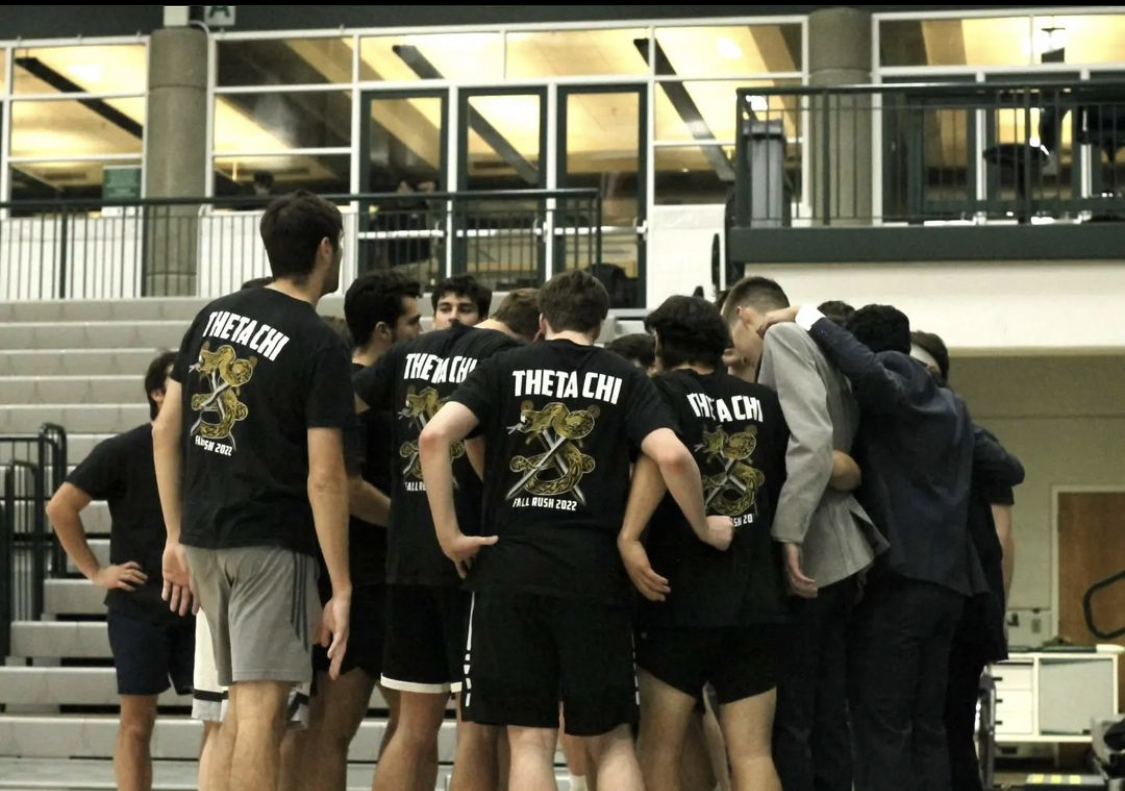
Credit: @iwuifc
Theta Chi playing at Shirk for the Greek basketball fundraising event in Fall 2022.
Greek Life in universities and colleges all over the U.S have been facing challenges, and Illinois Wesleyan is not unfamiliar with the decrease in students joining sororities and fraternities.
Over the last few years Greek Life on the Illinois Wesleyan campus has greatly declined. In 2014, 124 women registered for sorority recruitment at IWU and 86 percent of those women were placed into sororities. In 2022, only 44 women registered and 59 percent of them were placed.
There are eight sororities and fraternities at IWU. As of Spring 2022, there are over 375 undergraduate students total in Greek Life; less than 25 percent of the IWU population. In comparison, student athletes make up over 30 percent of the campus.
“Declining numbers in the Greek Life community is a trend that schools all over the country are seeing. Since college enrollment numbers are down, this affects Greek Life too,” said Julie Henderson, Assistant Director of Student Involvement.
In sorority life now, the total of each Greek house is limited to 61 members, compared to 2008 when there were around 95-103 members in each house.
Greek life on campus was not always on the decline. Since 1967, IWU’s campus has been home to international and national sororities and fraternities. “We’re a very historically old community here, probably one of the 15 oldest in America,” said Kevin Carey, Associate Dean of Students.
Alumni have had positive experiences with Greek Life at IWU. “For me it exceeded expectations as well by providing a new purpose in serving and giving back to both FIJI and IWU,” said Gates Ehrhart, 2018 Alum and member of Phi Gamma Delta.
How does a decline in Greek Life impact IWU?
A negative impact is housing. Sorority homes are owned by the individual sorority and the less members they have, the emptier their house. With less people living in the Greek houses there will be less variety and space in on-campus housing. The three fraternity homes are least affected, because they are owned by the campus which subjects members to the standard room and board fees.
The decline has affected the campus as a whole. The number of students who participate in Greek Life affects the social scene, as Alumni reminisce on times where sororities and fraternities were the organizers of major campus events.
Have RSO’s replaced Greek Life?
Students are also less likely to engage in the Greek Life system for activities when there are now 94 active Registered Student Organizations (RSO) on IWU’s campus. Campus Activities Board and Student Senate are some of the more popular RSO’s today.
Other RSO’s range from Students of Color in STEM, Guerilla Film Club and Cheerleading. With the amount and variety RSO’s offer, students find more fitting extracurriculars than the standard and limited Greek Life organizations.
Additionally, some may prefer non-Greek affiliated RSO’s due to the lack of stigmas or stereotypes. “Hazing is a big fear for every individual going into an organization and it can be presented in several different ways. I think people would rather be safe than sorry when it comes to joining organizations,” last year’s President of Kappa Delta Lindsey Haan said.
People on the outside of the Greek community have built in perceptions about Greek Life that don’t exist for other RSO’s on campus. There are countless examples in the media portraying Greek Life as just a drinking and hazing free for all.
But is that all? IWU places fairly strict guidelines on hosting events no matter the organization. Greek organizations and RSOs are both held to a certain standard on social hosting protocol. “We have a safe social hosting policy where chapters can register and fraternities mostly host BYOB events,” Carey said. “Those have to be registered and there are policies and procedures in place for that.”
Greek Life today has a less than substantial presence on IWU campus. Is it because of hazing stereotypes and new RSO’s becoming popular? Is there a trend that has occurred over the last few years that went over IWU’s head? Or is there more to the story?

